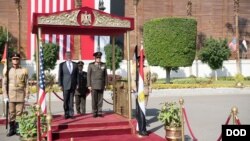U.S. Defense Secretary Jim Mattis says he does not plan to “prod” Pakistan, but expects it adhere to its promises to combat terrorism, as he embarks on his first visit to Islamabad as Pentagon chief.
Speaking aboard a military plane, Mattis said he does not expect to butt heads during his Monday meetings with Pakistani Prime Minister Shahid Khaqan Abbasi and Army Chief Qamar Javed Bajwa.
“That’s not the way I deal with issues,” Mattis said. “I believe that we [can] work hard on finding common ground and then we work together.”
In October, Mattis warned the United States is willing to work “one more time” with Pakistan before taking “whatever steps are necessary” to address its alleged support for militants.
But on Sunday, Mattis said he is focused on trying to find “more common ground ... by listening to one another without being combative.”
The United States has for a decade accused Pakistan of sheltering or having ties to terrorists, such as the Haqqani Network and the Afghan Taliban, which attack NATO coalition forces in neighboring Afghanistan.
Islamabad rejects the accusation, saying Washington is scapegoating Pakistan for its own failures in Afghanistan, where the United States remains in a stalemate after 16 years of war.
Tougher stance
Before Mattis’ visit, other Trump administration officials are taking a harder public stance on Pakistan.
Speaking at a defense forum Saturday, CIA director Mike Pompeo said, “We are going to do everything we can to ensure that safe havens no longer exist,” if Pakistan does not heed the U.S. message on militants.
Since 2004, the CIA has conducted drone strikes - mostly against al-Qaida and Pakistani Taliban targets - in northwest Pakistan, near the border with Afghanistan.
The United States is considering expanding those strikes, along with several other measures, according to media reports.
Other options include downgrading Pakistan’s status as a major non-NATO ally or sanctioning individual Pakistani leaders suspected having ties with the Taliban.
But any kind of punitive action wouldn’t take place for at least a few weeks at minimum, predicts Michael Kugelman, a South Asia analyst with the Woodrow Wilson Center.
"I think [the administration] wants to give the Pakistanis a bit more time to see if they're responding to the various demands the United States made of them when it comes to cracking down on terrorists," said Kugelman.
One of the likelier U.S. responses, according to Kugelman, is expanding not only the geographic scope of the drone war, but also widening the type of targets the United States goes after.
"I think we could start seeing the U.S. trying to target more Haqqani Network and Afghan Taliban targets," especially in the sparsely populated Baluchistan and Khyber Pakhtunkhwa provinces, he said.
The Trump administration has also threatened cut off aid to Pakistan. Since 2002, the United States has given over $33 billion in assistance to Pakistan. But the aid has already been cut sharply in recent years.
Pakistani leverage?
If ties were to deteriorate, the United States also has much to lose. Pakistan controls U.S. military supply routes to landlocked Afghanistan, and could close them down, as they did in 2011. The United States would also like Pakistan to scale back its nuclear modernization, improve ties with India, and stay engaged in the broader fight against Islamic militants.
But despite the risks, Michael O'Hanlon, a senior fellow at the Brookings Institution, warns Washington appears to be running out of patience.
"For many years we were trying to hold out hope that the Pakistanis would change their mind about Afghanistan and our role there," he said. "But those kinds of hopes aren't as prevalent anymore. And on balance, therefore, I think we are closer to using some of those tougher methods."
Mattis, who is on a regional tour that also took him to Egypt, Jordan, and Kuwait, wouldn’t elaborate on any possible U.S. action. But he says the situation is pressing.
“There’s always an urgency to something when 39 nations plus Afghanistan have their troops in the midst of a long war where casualties are being taken,” he said.




